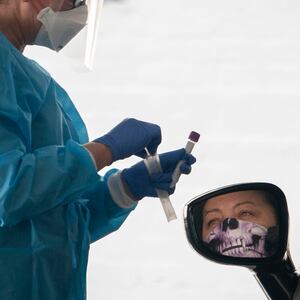It’s the supposedly rapid test that President Trump claimed was “lightning-fast” and about to usher in “a whole new ballgame” in COVID-19 detection. But since then, the fine print has started to creep into the Trump administration’s rhetoric about Abbott Labs’ diagnostic coronavirus tests and where they can be useful.
When asked by Sen. Lamar Alexander (R-TN) about the possibility of rapid testing for meatpackers during a hearing on Tuesday, Assistant Health and Human Services Secretary Admiral Brett Giroir noted that, while Abbott’s test can deliver results in the promised 15 minutes, their low throughput rate, or number of tests they can run at the same time, limits the situations where using one makes sense. “The one tradeoff, however, is that the rapid—the, quote, rapid point of care diagnostics are very slow. So each machine can only do four per hour and that’s very, very slow,” Giroir said.
The exchange was one of several during Tuesday’s hearing where senators pressed the Trump administration’s top health officials for answers on how to scale up testing so that state and local health officials can manage the reopening of their communities. Trump officials say they expect the U.S. will be capable of doing over a million tests a day by the fall, but experts say we’re going to need nearly that much right now. Slow machines won’t help much.
Welcome to Rabbit Hole, where we dive deep on the biggest story. It’s for Beast Inside members only. Join up today.
Fine print: When the FDA first approved Abbott Labs’ coronavirus tests in late March, the Trump administration found itself on a steep rising curve of deaths and infections, with American testing plateauing at a little over 100,000 a day, lagging behind countries like South Korea on a per capita basis and leading to intense criticism of Trump’s pandemic management. In that sense, the availability of an Abbott Labs-branded ID NOW test seemed like a bright spot amid testing shortages and backlogs.
“On Friday, the FDA authorized a new test developed by Abbott Labs that delivers lightning-fast results in as little as five minutes. That’s a whole new ballgame,” Trump said during a press conference.
His words echoed the comments of former Trump administration FDA commissioner Scott Gottlieb, who acts as an informal adviser to the White House coronavirus task force. “This is GAME CHANGER,” Gottlieb tweeted when news of the ID NOW test’s availability broke in March.
But like many COVID-19 announcements made by the Trump administration, the rhetoric got ahead of the underlying realities. That’s not necessarily the fault of Abbott’s system. The company’s tests still run in the time advertised when they were first approved by the FDA—15 minutes for a negative result and five minutes for a positive one. Nor has the throughput rate changed.
Results for traditional, lab-run molecular coronavirus tests can take hours, or in some cases days. But they’re run in large batches of dozens or hundreds at a time, meaning they trade volume for speed. By contrast, Abbott’s coffee machine-sized ID NOW platforms result in a throughput rate of four tests per hour.
Abbott Labs declined to comment when contacted by The Daily Beast for this story.
The Abbott tests are point-of-care systems, which means they’re designed not for processing results from mass testing operations like the drive-through community testing facilities. Instead, they are used in more boutique settings like a small doctor’s office or to test staff in health care facilities like nursing homes or hospitals. The White House uses an ID NOW system to rapidly test its smaller pool of staff, something that’s become particularly important as infections have crept in among the president’s senior staff.
Hoping for a million plus: Giroir testified that the Trump administration expects to have the capacity to carry out 40 million to 50 million tests a month by the end of the fall. That top line number works out about 1.3 million to 1.6 million tests per day—compared to an average of about 312,000 tests per day carried out over the past five days, according to data from the COVID-19 Tracking Project.
It’s an ambitious goal for the fall, but for the moment testing remains in entirely too short supply, by some estimates. A study by Harvard’s Global Health Institute estimated that the U.S. needs to hit 900,000 daily tests in order to manage the outbreak, or three times as much as we’re doing now.







